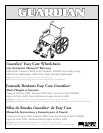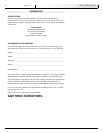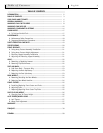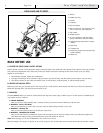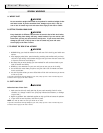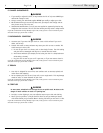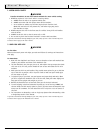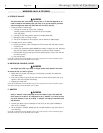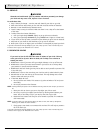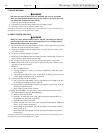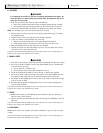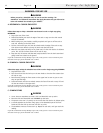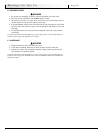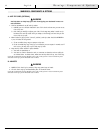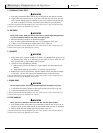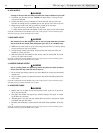
WARNINGS: FALLS & TIP-OVERS
A. CENTER OF BALANCE
WARNING
The point where this chair will tip forward, back, or to the side depends on its
center of balance and stability. How your chair is set up, the options you select
and the changes you make may affect the risk of a fall or tip-over.
1. Center of balance is affected by:
a. A change in the set-up of your chair, including:
• Seating system consisting of cushion and or back support;
• The seat height
b. A change in your body position, posture or weight distribution.
c. Riding your chair on a ramp or slope.
d. The use of a backpack or other options, and the amount of added weight.
2. To reduce the risk of an accident:
a. Consult your doctor, nurse or therapist to find out what axle and caster position
is best for you.
b. Consult your authorized supplier BEFORE you modify or adjust this chair. Be aware
that you may need to make other changes to correct the center of balance.
c. Have someone help you until you know the balance points of your chair and how
to avoid a tip-over.
d. Use anti-tip tubes.
If you fail to heed these warnings damage to your chair, a fall, tip-over or loss of control may occur
and cause severe injury to the wheelchair user or others.
B. DRESSING OR CHANGING CLOTHES
WARNING
Your weight may shift if you dress or change clothes while seated in this chair.
To reduce the risk of a fall or tip-over:
1. Rotate the front casters until they are as far forward as possible. This makes the
chair more stable.
2. Lock anti-tip tubes in place. (If your chair does not have anti-tip tubes, back it up
against a wall and lock both rear wheels).
3. Engage your wheel locks.
If you fail to heed these warnings damage to your chair, a fall, tip-over or loss of control may occur
and cause severe injury to the wheelchair user or others.
C. WHEELIES
WARNING
Doing a "wheelie" means balancing on the rear wheels of your chair while the
front casters are in the air. It is dangerous to do a "wheelie" as a fall or tip-over
may occur. However, if you do it safely, a “wheelie” can help you overcome curbs
and obstacles.
1. Consult your doctor, nurse or therapist to find out if you are a good candidate to
learn to do a “wheelie.”
2. Do not attempt a “wheelie” UNLESS you are a skilled wheelchair user of this chair or
you have help.
If you fail to heed these warnings damage to your chair, a fall, tip-over or loss of control may occur
and cause severe injury to the wheelchair user or others.
8
English
Warnings: Falls & Tip-Overs



